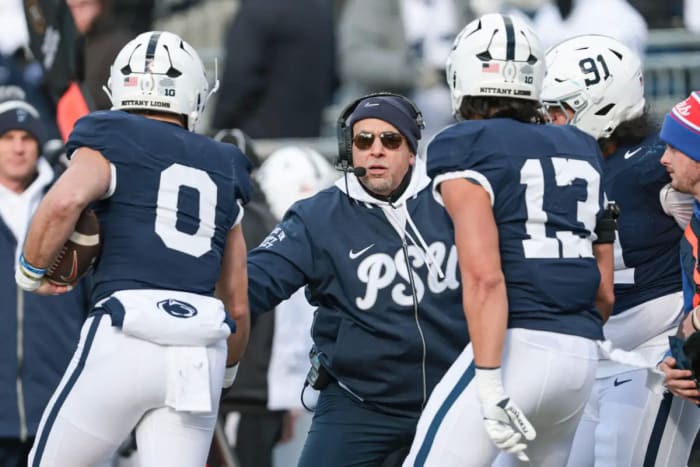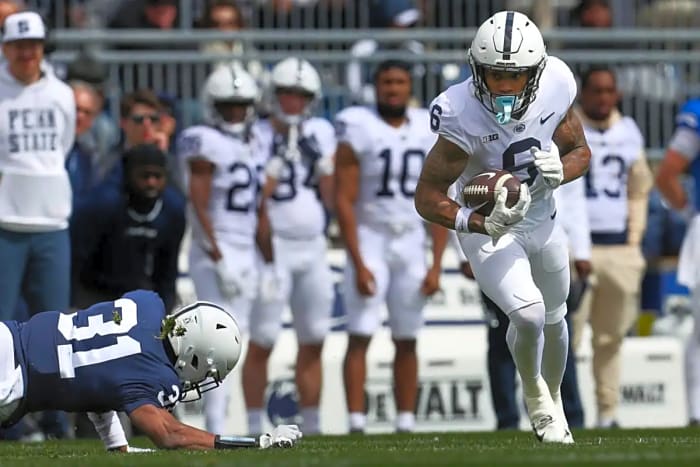
The year was 2005.
On a gorgeous spring morning in Happy Valley, excitement filled the air. It was time for the annual Penn State Football Blue-White game. This particular day held a special place in my heart. I made the journey from North Carolina to reconnect with family and share in the experience of the game. My nephew, just 10 years old and bursting with passion for Penn State, had never attended a game before. I knew this day would mean the world to him, so I decided to surprise him by bringing him along. What a day it was! The atmosphere was electric, brimming with activities for kids, an abundance of merchandise, and heartfelt giveaways of team memorabilia. We even had the chance to meet the players on the field for autographs before kickoff—a moment that felt pure and joyful. It was simply delightful, a day filled with laughter and excitement. Fast forward twenty years. It’s now 2025. That little boy, now 30, stands as a remarkable Army Ranger, sharing his life with a wonderful wife and a young son. Yet, despite all the changes life has brought, he still remembers that Spring Game as one of the best days of his life—an unforgettable memory etched in his heart.As I look around, I notice a concerning trend. Many teams are shying away from spring games, citing various reasons that feel like an erosion of the simplicity and joy we once knew. College football has evolved, its essence twisted by the relentless drive for competitiveness. No longer is it just a feel-good experience; it has transformed into a business, a high-stakes game where the joy can feel lost. Spring games have turned into potential burdens, overshadowed by the pressures of extended regular seasons and the lurking threat of rival scouts. All the while, tampering—once an unspoken concern—now looms large, infringing on the spirit of the game. It’s a world where winning is paramount; teams are playing their cards close, shrouded in secrecy and fearing exposure at all costs. Matt Rhule from Nebraska highlighted tampering as a significant reason for scrapping their spring game, recalling how other programs were eyeing his players right after their spring game last year. More and more, programs like USC, Ole Miss, Texas, and Nebraska are choosing to forgo their spring games, but amidst this shift, Penn State remains steadfast. They will hold the Blue-White Game at 2 p.m. on Saturday, April 26—albeit with some adaptations. It’s a relief to cling to this cherished tradition, reminding us all of simpler, happier times.
Penn State Football Adapting to Preserve Spring Game
Recently, Penn State Head Coach James Franklin spoke at length regarding the importance of the spring scrimmage. “Let me be perfectly clear: it would make no sense for me to even suggest that we wouldn’t hold a spring game,” Franklin expressed passionately. “This event is more than just a game for us; it’s a celebration. The university organizes numerous fundraising events around it, drawing people into our community. It feels like a spring homecoming, a time when everyone gathers together, and that will always be a significant part of our decision.” This year brings some changes, notably that the Blue-White Game won’t be broadcasted on television, although fans will still be able to catch the action on radio. In past seasons, teams such as Penn State have been proud to showcase the game on the Big Ten Network, but this year, that’s just not the case. Many programs that have canceled their spring games have seen it merely as an opportunity for competitors to spy on formations and strategies. This is the most notable reason that programs are canceling spring games; they have become a tool to poach talent via the spring transfer portal window and a brief glimpse into even the most vanilla of playbooks, in the months ahead of summer camp and the regular season kicking off. It isn’t the only concern, though.
When discussing player safety, Franklin mentioned that live hitting might not be an option this time. “We have to be careful; the last thing we want is injuries,” Franklin explained. “So we’re looking at a blend of live action and some controlled tackling—just enough to give fans a glimpse of what’s to come.” “I want fans to leave feeling like they’ve truly witnessed something worthwhile,” Franklin said, radiating enthusiasm. “I want them to think, ‘Wow, I have a good sense of what Penn State football will be like moving forward!’” Franklin also shared thoughts on potentially shortening the game and doing away with halftime. “We’ve had years where 75,000 fans come out, but then our lengthy halftime lures them away to tailgate instead of staying for the second half,” he noted with a smile. “So, it’s likely we’ll condense things—a quicker game with shorter quarters and maybe no halftime.” Yet, Franklin emphasized that the essence of the game shouldn’t diminish. “I know we have die-hard Nittany Lion fans who cherish this tradition,” Franklin said earnestly. “I want every fan to feel that spark, to talk about the experience at the barber shop or over the water cooler, sharing their excitement for what’s ahead for Penn State football.” “I’ve spent enough time at Penn State to truly grasp the deep connection that Penn State football has with this entire community,” Franklin explained, his voice passionate. “I think we all recognize that, right? There has to be a sense of collaboration here. When our football program thrives, it lifts everyone around us.” This perspective is vital. When programs decide to cancel spring games, they’re not just skipping a day of football; they’re also taking away a weekend of valuable support for our local businesses.
The Value of Spring Football Games

In this competitive world where winning seems to reign supreme, sacrifices must be embraced—even by the fans and the community—if they hope to give their team every edge it needs to succeed. For me, I’ll be tuning into the PSU spring game on my phone through iHeart Radio. It takes me back to my childhood, those moments spent listening to baseball games. You can picture it vividly, the host’s voice weaving the story in your mind. Things have undoubtedly shifted; so much has transformed. Some changes have been great, while others not so much. But a heartfelt shoutout to head coach James Franklin and the Penn State leadership for holding onto what truly matters—That bond is what makes it all worthwhile. The fans and the community.
More must-reads:
- Pat McAfee has strong reaction to Hall of Fame honor
- The highest-paid college QB has been revealed
- The 'Second-leading receiver by NFL team' quiz
Breaking News
Trending News
Customize Your Newsletter
 +
+
Get the latest news and rumors, customized to your favorite sports and teams. Emailed daily. Always free!








